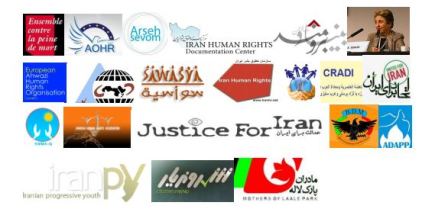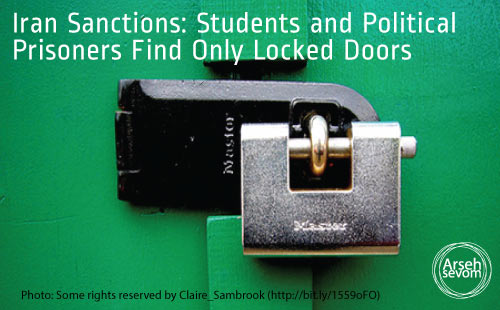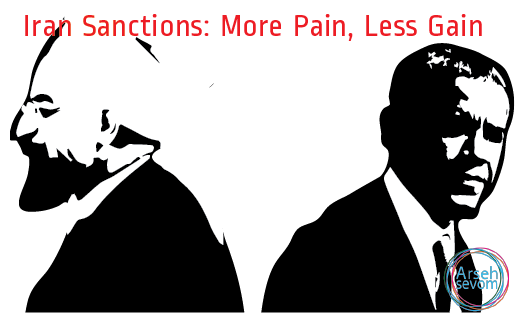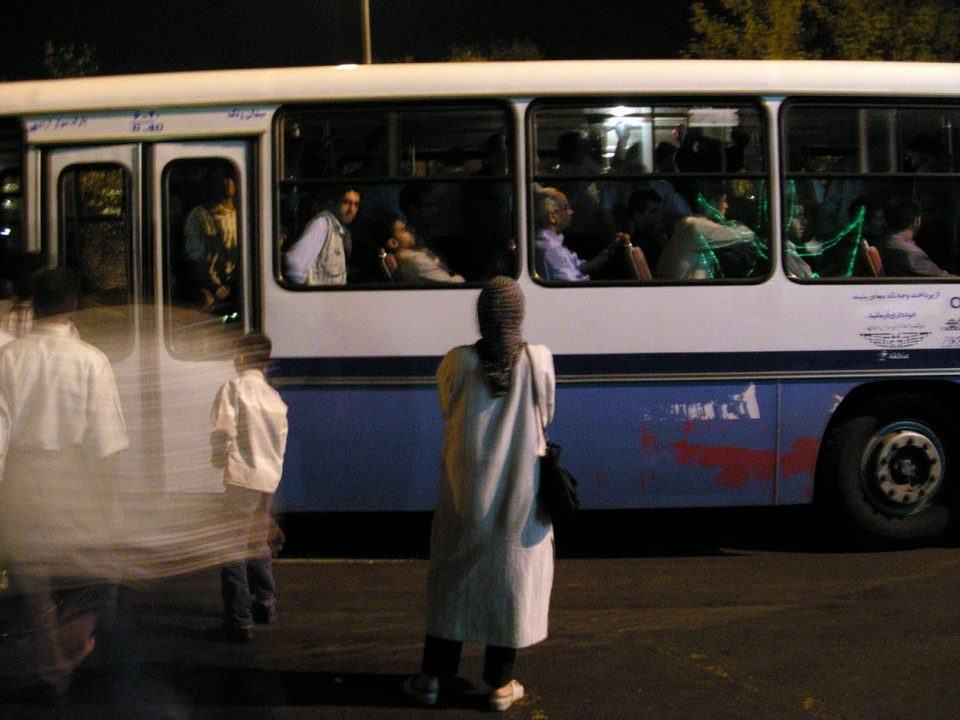
Iran: Release Azerbaijani Rights Activists on Hunger Strike
August 12, 2013
Iran — Sanctions Lock Doors for Civil Society
August 20, 2013
Arseh Sevom – It seems that the least productive U.S. congress in more than 50 years, agrees on one thing: loading sanctions upon sanction on Iran. The new laws seem to be counter-productive, are hurting ordinary Iranians, and harm chances for negotiations. Iranian researchers are cut off from scientific publishing. Patients are finding it more and more difficult to not only find medication, but get coverage for it with their insurance as well. Arseh Sevom’s Peyman Majidzadeh provides a round-up in his current overview, expressing his concern and frustration with the contradiction between the expressed intentions of the imposed sanctions and the harsh realities that result.
by Peyman Majidzadeh
Iranian Thalassemia Patients Dropped from Insurance Coverage
ILNA [fa] reported on Saturday that people with thalassemia are being dropped from insurance coverage. Majid Arasteh, head of the Iranian Thalassemia Community, said in an interview with ILNA that the country’s two major insurance companies have dropped a number of patients with thalassemia from their coverage in order to cut costs. The patients include those who do not need blood injections. According to Arasteh, the insurance companies have changed their criteria and do not consider this group vulnerable any more.
This adds to the problems thalassemia patients already faced. In an earlier report [fa], ILNA reported on shortages of the drug “Desferal.”
The impact of blanket sanctions, coupled with mismanagement by the Iranian authorities, continues to take lives of innocent people in Iran.
“Strangling Iran” Bill, On the House
A few days before Rouhani takes the oath of office, the US House of Representatives passed a new legislation on Wednesday 31 July 2013 to put in motion new rounds of sanctions against Iran. One wonders to weep or get angry about this bill and its timing! The Los Angeles Times [en] reported that the House passes the bill despite Obama administration concerns that the new sanctions could undermine the new Iranian president in upcoming nuclear negotiations. The vote count in the House left no questions: 400 to 20 in favor of the sanctions. The sanctions are mostly focused on Iran’s oil exports, which has been cut nearly in half as a result of international sanctions over the past year.
It is almost impossible not to take this personally and assume it is in the best interest of the US and is not aimed at helping the ordinary citizens in Iran…
The new sanctions caused reactions from Iranian politicians. In his remarks, conservative MP Ali Motahari criticized the American congress, saying that they had planned to put the sanctions on hold, but instead passed a new resolution adding even more sanctions. As Motahari added, let’s wait and see what attitude the Rouhani administration will take on the US and the sanctions.
Rouhani Mans Up
On Saturday 3 August, Hassan Rouhani formally began his presidential term after being endorsed by Supreme Leader. The next day was his inauguration ceremony. He took the oath of office before national and international figures. In the most important part of his speech, he said:
If you want the right response, don’t speak with Iran in the language of sanctions (tahrim), speak in the language of respect (takrim).
The ceremony was held with the notable absence of former presidents Ahmadinejad and Khatami; one did not attend, while the latter was not invited. At the end of the ceremony, Rouhani presented a list of his suggested ministers. (See the list of the ministers here.) As expected, the cabinet is not totally reformist, but pragmatic technocrat. Now, it is up to the parliament to approve the suggested ministers.
Rouhani’s first press conference was held shortly after on Tuesday 6 August. In the conference, Rouhani called for “serious and substantive” negotiations with the international community about Iran’s nuclear program, stating that he is “not pessimist” on the issue. He said that “Political Crime” should be defined, emphasized women’s rights and demands and, to answer an urgent question from the Iranian people, said that his administration will continue paying people their subsidy in cash. Words were nice, and now everyone hopes the results are promising as well.
Mr. President, You are under Civil Watch!
After the Egyptian site Morsi Meter, which tracked Mohamed Morsi’s actions as president, it is time for the newly-inaugurated Hassan Rouhani to feel the heat. Rouhani Meter is a similar project to monitor Rouhani’s performance in his first 100 days in office and beyond. The website classifies Rouhani’s promises in four categories and monitors his achievements. Now he should know that he is under civil surveillance and, of course, Morsi’s story is a clear warning. Global village, new challenges for presidents and other political figures!
Iran Banned in Academic and Virtual Sphere
Presstv [en] reported that the UK-based Taylor and Francis Group has taken a new policy not to publish Iranian articles financially supported by the Islamic Republic’s administration. Earlier in April, the famous Netherlands-based publishing network Elsevier reluctantly abided by US law and banned the publication of Iranian articles submitted by organizations connected to the administration.
While some may call them “smart sanctions,” I see them far from smart as they are negatively affecting Iranian students and activists, yet another contradiction in US foreign policy. What could they possibly have done wrong to deserve such harsh punishments? Can isolation from the scientific field and the inability to merely publish their work lead to a durable solution to the issue?
On a separate note, Advar News [fa] reported that the website of Mehdi Karrubi, Iranian opposition leader who has been living under house arrest for more than 900 days now, is blocked as a result of sanctions. Foreign servers are reportedly restricted from hosting .ir web-domains by a new rule administered and enforced by The Office of Foreign Assets Control (OFAC) of the US Department of the Treasury.
Ahmadinejad, Back in the Game
Everyone is well aware of tensions [en] that arose between Ahmadinejad and the Supreme Leader, Ali Khamenei during the former’s second term as president. This led to Ahmadinejad and his supporters being named a “deviant current,” with many observers predicting his arrest once the presidential term ended.
Once again, Mahmoud Ahmadinejad shows us that he still has the capacity to surprise us. His “worthy efforts” as president were rewarded by direct order of Khamenei who appointed him as a member of Expediency Discernment Council. Former President Akbar Hashemi Rafsanjani, a fierce critic of Ahmadinejad, heads the council. Surprisingly, Ahmadinejad did not attend most sessions of the Council during his presidential term. It seems that the “miracle of the third millennium” is not going to leave Iran’s political scene anytime soon.
Nothing should come as a surprise for the Iranian people anymore.
Sherko Bekas Joined Ahmad Shamlou: Forever Alive
Mehrnews [fa] reported that Sherko Bekas, the famous Kurdish poet, died of cancer on Sunday 4 August at the age of 73 in Stockholm. Bekas, born in Iraq, was well-appreciated by all members of Kurd community both in Iran and Iraq. He spent most of his life trying to bring freedom to Kurd people. His second book was published in Mahabad, Iran. Some of his works were translated and published in Iran.
July 24th also marked the 13th anniversary of the iconic Iranian poet, Ahmad Shamlou, whose name is not separable from Iran’s history. He is famous for his command of the Persian language, his valuable social research, and his commitment to the political and social responsibility of artists.
No, they are not dead.





